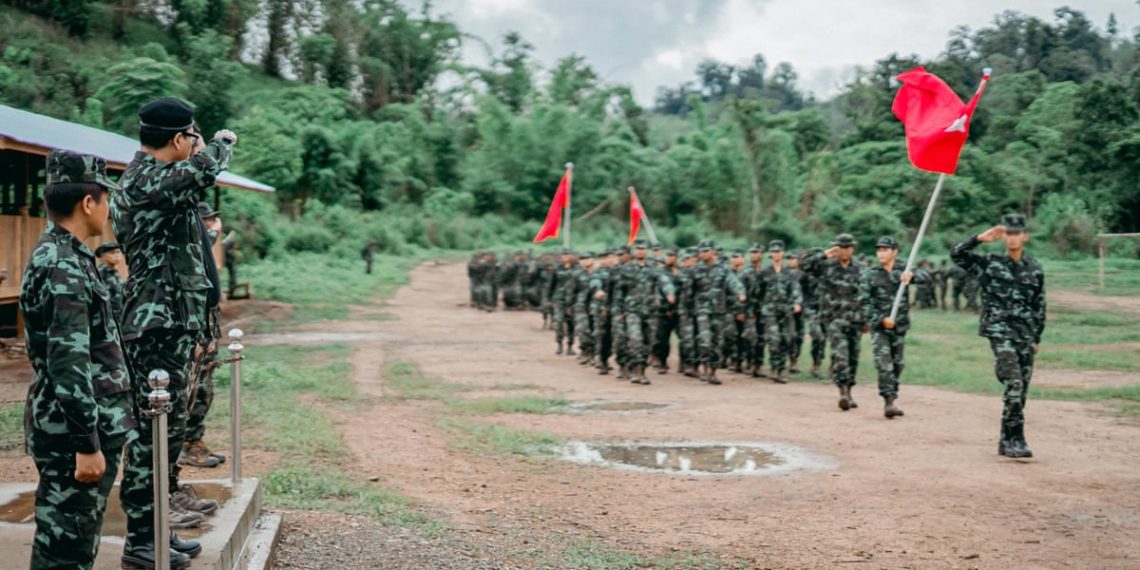Myanmar three years after the coup: cracks in military in an endless drama
Resistance supporters staged a silent strike on the anniversary of the deposition of Aung San Suu Kyi's government, while pro-militia groups expressed support for the regime. But signs of relenting have increased in recent months, militias have begun discussions on dividing recaptured territories, and Beijing, having gotten what it wanted may avoid further involvement.
Yangon (AsiaNews) - Three years have passed since the coup d'état that shocked Myanmar, and, even if the military regime seems to be in crisis, it is difficult to outline what the country's future could be.
Today, on the occasion of the anniversary, while supporters of the anti-coup resistance organized yet another silent strike in the big cities to once again affirm their opposition to the regime, the pro-military demonstrators, including several nationalist monks, occupied and paraded through the streets of Yangon, the former capital and economic-financial center of the country.
On February 1, 2021, the day on which the new Parliament elected in November 2020 was supposed to take office, the military took power by arresting the leader Aung San Suu Kyi, who is still held in solitary confinement in a prison in the capital Naypyidaw.
The street demonstrations that followed the coup were bloodily repressed, giving rise to a civil conflict that has devastated the country: according to data, almost 80 thousand houses were burned, of which 30 thousand in the last year alone.
The internally displaced people, who before the coup numbered around 500 thousand due to the conflict between ethnic militias and the central government, are now 2.6 million and, in addition to not having access to education, health services and work, they often also suffer from the lack of water and food, because roads and transport are continually blocked by fighting.
Human rights organizations have repeatedly denounced the bombings against the civilian population, which were also carried out using cluster bombs in violation of humanitarian law. In the last three years, over 25 thousand people have also been arrested, of which almost 20 thousand are still in prison, where they suffer torture and abuse.
Although several governments have imposed sanctions against Myanmar's junta-controlled state companies (the United States launched further restrictions yesterday), over the past year the military has still managed to obtain fuel for its jets by evading sanctions through a series of intermediaries , revealed an investigation by Amnesty International.
However, even if the army has decided to extend the state of emergency for another six months, trying to maintain its grip on power, signs of weakening and external pressure have increased in recent months: last month the monk Pauk Ko Taw proposed replacing General Min Aung Hlaing, who leads the army.
China intervened by proposing a ceasefire in the Shan State, avoiding (at least for the moment) the total defeat of the pro-regime soldiers in the northern areas.
But the morale of the troops is very low (hundreds of soldiers have surrendered to the anti-coup militias or have deserted seeking refuge abroad) and a further defeat could lead to the capitulation of the Burmese army.
A series of events that arose as a result of Operation 1027, the joint offensive launched at the end of October by three ethnic militias - the Ta'ang National Liberation Army (TNLA), the Arakan Army (AA) and the 'Myanmar National Democratic Alliance Army (MNDAA).
In recent months, resistance forces have reconquered dozens of cities and military outposts, sparking discussions about a possible division of territories once the conflict ends.
Although the Government of National Unity in exile, made up of former deputies of the previous executive, has proposed the creation of a new federal state, it is still difficult to imagine how this could be put into practice.
The ethnic militias have in fact demonstrated that they have different political objectives and it is not clear the role that Russia (the main supplier of weapons to the Burmese junta) and China, which has no interest in putting an end to the civil war, may have in protect its citizens and its commercial affairs in the country, regardless of who comes to power.
After having brokered the truce in the Shan State, where the militias took control of the Kokang region, Beijing in fact obtained that the military junta handed over to the Chinese authorities three mafia bosses (Bai Suocheng, Wei Chaoren and Liu Zhengxiang) responsible for the management of the online scam centers hiding in Myanmar.
Although thousands of Chinese citizens had already been repatriated in recent months, the arrest of the leaders was defined as a "historic achievement" by Beijing. Its diplomatic efforts in Myanmar could therefore also stop here.
07/02/2019 17:28







.png)










